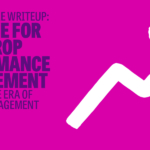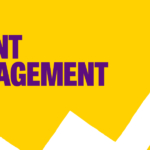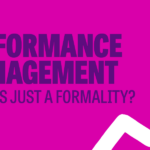Year-end reviews are back on the agenda. Yet despite the time and effort invested, research shows that only 5% of HR managers are satisfied with their current performance review processes, and 59% of employees believe traditional reviews have no impact on their performance.
The problem isn’t the review itself — it’s how we approach it. At Let’s Talk Talent, we believe performance reviews can be powerful tools for motivation and growth when they’re part of a broader performance development approach. That means moving away from tick-box compliance and towards conversations that unlock contribution, clarify expectations, and support career progression.
This article walks through the 10 most common performance review mistakes we see, why they matter, and what to do instead.
In this article you’ll discover:
- Why performance reviews go wrong (and what they’re for)
- The top 10 performance review mistakes (and how to fix them)
- How to turn your process into a performance development experience
- FAQs about performance reviews
Why Performance Reviews Go Wrong (and What They’re For)
Performance reviews should align expectations, recognise contribution, and plan development. So why do they so often feel demotivating or pointless?
The answer: process-heavy systems, underprepared managers, fear of difficult conversations, and lack of follow-up. When reviews become about getting forms signed rather than genuine conversation, they lose their power.
What good performance development looks like:
- Ongoing feedback, not just annual surprises
- Clarity about what good performance means
- Shared responsibility between manager and individual
- Focus on growth, not just rating the past
- Follow-through with regular check-ins
When done right, reviews drive real results. Companies implementing regular feedback see 14.9% lower turnover, whilst managers receiving feedback on strengths show 8.9% greater profitability.
If you want to build a performance management approach that fits your organisation, explore our performance management consultancy services.
The top 10 performance review mistakes (and how to fix them)
Here are the 10 most common performance review mistakes we see, and the best ways to remedy them.
Mistake 1: Not Preparing Enough
What it looks like: Managers rush into reviews without reviewing notes, gathering feedback, or revisiting objectives.
Why it’s a problem: Lack of preparation signals the person doesn’t matter. It undermines trust and wastes everyone’s time.
Try this instead:
- Block 30–60 minutes per review — research shows effective managers spend 3–5 hours preparing
- Revisit objectives, self-assessments and notes from the full year
- Gather input from 5–8 peers and stakeholders (but form your own view first)
- Use a simple template to ensure consistency
- Batch preparation if you’re time-poor by scheduling all reviews in one week
Mistake 2: Avoiding Negative Feedback
What it looks like: Glossing over development areas, using vague language, or being ‘too nice’ to avoid difficult conversations.
Why it’s a problem: Sugarcoating creates confusion, not clarity. Without honest feedback, people can’t grow.
Try this instead:
- Balance feedback — recognise strengths AND development areas
- Use the SBI model (Situation–Behaviour–Impact): ‘In Tuesday’s client meeting, when you interrupted the CFO, it undermined our credibility’
- Practise difficult conversations or role-play with colleagues
- Ask coaching questions: ‘What would you do differently next time?’
- Remember: challenge and support must go hand in hand
Need support building manager confidence? Our coaching and assessment services can help. Read our guide on how to give great feedback.
Mistake 3: Not Being Focused Enough
What it looks like: Checking phones, replying to emails, or allowing interruptions during the meeting.
Why it’s a problem: It signals the person isn’t important and permanently damages trust.
Try this instead:
- Book 45 minutes and go device-free
- Share an agenda in advance
- Take time beforehand to decompress and focus
- Treat it as interruption-free — device-free time is a sign of respect
Mistake 4: Bringing Up New Elements
What it looks like: Raising feedback the employee has never heard before — dropping surprises into the review.
Why it’s a problem: Surprises trigger defensiveness and prevent productive conversation. Reviews should be summaries, not revelations.
Try this instead:
- Adopt a ‘no surprises’ principle — any feedback should already have been discussed
- Build a rhythm of regular one-to-ones where feedback flows continuously
- Keep notes throughout the year of contributions and development areas
- Save reviews for summarising themes, not introducing new issues
Performance reviews work best as compilations of ongoing discussions. Explore whether your performance reviews are just a formality.
Mistake 5: Only Reviewing A Portion Of The Year
What it looks like: Letting recent months overshadow the full year — focusing only on what’s freshest in your mind.
Why it’s a problem: This is recency bias, and it’s unfair. Performance fluctuates — reviews need to reflect the whole picture.
Try this instead:
- Keep a performance log throughout the year with notes and examples
- Ask employees to bring examples from the full period
- Look for patterns and trajectory, not isolated incidents
- Acknowledge context — performance varies with workload and circumstances
- Document wins and development areas as they happen
Mistake 6: Bundling Appraisals And Pay Reviews
What it looks like: Discussing performance and salary in the same meeting — mixing two highly emotive conversations.
Why it’s a problem: When combined, employees may focus on the pay number and miss development messages entirely.
Try this instead:
- Schedule separate meetings — at least a week apart
- Be clear what influences each: performance vs market rates and budget
- Provide written context about what employees can influence
- Frame performance reviews as forward-looking, not transactional
- Use performance conversations to discuss growth and career trajectory
Mistake 7: Focusing On The Process, Not The Individual
What it looks like: Treating reviews as box-ticking exercises to submit forms to HR — going through the motions.
Why it’s a problem: It reduces people to data points. When reviews are just about forms, they fail to generate motivation.
Try this instead:
- Remember the purpose: recognising contribution and setting people up for success
- Use forms as guides, not scripts — adapt questions to the individual
- Understand what motivates each person: skills, career goals, strengths
- Create objectives that stretch and inspire, not just ‘off the shelf’ role descriptions
- Share accountability across HR, managers, and individuals
Great reviews are about the person, not the paperwork. For frameworks that balance process with personalisation, explore our careers and performance consultancy.
Mistake 8: Doing All The Talking (Not Actively Listening)
What it looks like: Managers dominate the conversation, leaving no space for employee reflection or dialogue.
Why it’s a problem: Reviews should spotlight the individual. If managers do all the talking, there’s no space for self-reflection or ownership.
Try this instead:
- Ask open questions: ‘What are you most proud of?’ ‘Where do you want to grow?’
- Use silence — give people time to think
- Reflect back: ‘So you’d like more visibility with senior stakeholders?’
- Ask for self-reviews in advance to encourage ownership
- Aim for employees to do 60–70% of the talking
The person being reviewed should do most of the talking. Your role is to guide, listen, and support.
Mistake 9: Not Being Clear On What You Are Reviewing
What it looks like: Vague feedback with no clear link to expectations — ‘your performance needs to improve’ without specifying what or how.
Why it’s a problem: If people don’t know what ‘good’ looks like, they can’t achieve it. Unclear expectations create frustration and inconsistent standards.
Try this instead:
- Define performance clearly before the review: what skills, behaviours, and outcomes are expected?
- Separate what someone delivers from how they deliver and what they could do next
- Share expectations at the year’s start, not at review time
- Use specific examples tied to agreed objectives
- Put measurable metrics in place to track progress
- Check for consistency across your team
Don’t put people in boxes — tailor objectives to their strengths, skills, and ambitions.
Mistake 10: Not Following Up
What it looks like: The review ends, forms are submitted, and nothing happens until next year.
Why it’s a problem: Without follow-up, goals become meaningless. Progress stalls, motivation drops, and reviews feel performative.
Try this instead:
- Build in regular check-ins (30/60/90 days or quarterly) to review progress
- Create an action plan with 5–7 concrete actions, plus what employees need from you
- Schedule monthly ‘career coaching’ conversations separate from weekly one-to-ones
- Track development goals in ongoing check-ins, not just at year-end
- Provide learning and development opportunities
- Keep a running log of feedback throughout the year
A great review is just the start. The real impact comes from what happens next.
Turn Your Performance Review Process Into A Performance Development Experience
Performance reviews can be genuinely motivating tools when treated as part of a continuous performance development cycle, not an isolated annual event.
The key is balancing three elements: people, managers, and process. At Let’s Talk Talent, we help you find the sweet spot where all three come together to support your culture and drive results.
There’s no magic formula. Good performance management means finding what works for your specific context. Don’t be afraid to test and iterate. Organisations that move towards continuous feedback, clearer expectations, better manager training, and decoupling pay from development consistently see higher engagement and more meaningful reviews.
If you’d like support building or refreshing your approach, get in touch. We help UK organisations move from compliance-driven appraisals to motivating, growth-focused performance development.
Get in touch with the team here at Let’s Talk Talent to enhance performance management meetings today.
FAQs About Performance Reviews
How often should performance reviews happen?
While many organisations still run annual reviews, best practice is moving towards more frequent touchpoints. Quarterly or bi-annual formal reviews, combined with regular check-ins, help maintain momentum and reduce recency bias. Over 80% of companies use yearly assessments, even though research shows they’re not flexible enough for today’s workplace pace.
Should we link performance reviews to pay rises?
Separate the two. Discussing both in one conversation muddles messages. Pay is influenced by market rates and budget — factors outside an individual’s control. Hold separate meetings and be clear about what influences each decision. This allows both conversations to be more honest and impactful.
What should managers prepare before a review?
Review objectives, self-assessments, and notes from the full year. Gather input from 5–8 peers who work closely with the individual. Identify specific examples of strengths and development areas. Budget 3–5 hours for thorough preparation. Form your own view before reading peer feedback to avoid being entirely swayed.
How can we make reviews less stressful for employees?
Adopt a ‘no surprises’ approach — give feedback continuously throughout the year. Share agendas in advance, encourage self-reflection, and create device-free spaces. Frame reviews as conversations, not interrogations. Send review documents a few hours beforehand so people can process content. The formal review should be a summary, not a shock.
What’s the difference between performance management and performance development?
Performance management is often compliance-driven, focused on rating past performance. Performance development is about unlocking contribution, building capability, and supporting growth over time. At Let’s Talk Talent, we break performance into motivation and individual contribution, focusing on what people do and how they do it.
What if our managers lack confidence in giving feedback?
This is incredibly common. Invest in management and leadership development through training, coaching, or peer support. Teach practical frameworks like SBI (Situation–Behaviour–Impact), role-play difficult conversations, and normalise feedback year-round. Most managers have never had training on reviewing performance — that’s why they struggle.
How do we stop performance reviews from feeling like a formality?
Shift focus from form-filling to genuine conversation. Train managers to adapt approaches to individuals, spotlight growth and motivation, and follow up meaningfully. When reviews are part of a broader HR strategy focused on developing people, they stop feeling like tick-boxes and start driving impact. Remember: whilst HR can set frameworks, accountability should be shared across the business.



